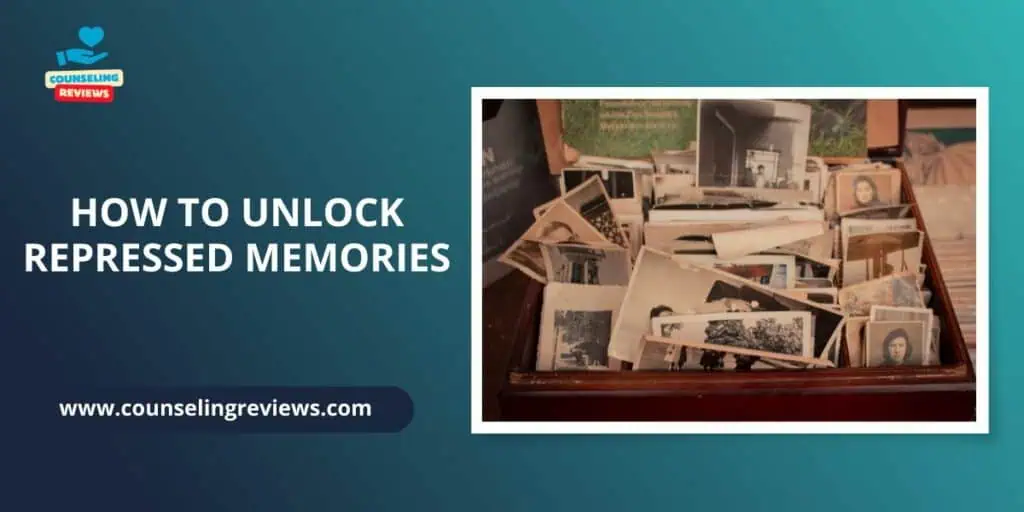The term repressed memory (also known as dissociative amnesia) refers to memories that are not stored in the conscious. The theory is that traumatic events can be so dysregulating that in order to cope, the person “forgets” or “improperly” stores the memory in an area of the brain that is difficult to access.
The topic of repressed memories and memory recovery is a highly debatable topic among therapists, researchers, and mental health professionals. This is due to the fact that people often believe their current mental health challenges may be related to a repressed traumatic event they are unable to recall. While most mental health professionals agree it is possible to forget and then remember traumatic memories, it is also rare.
Understanding Repressed Memories
More often than not, traumatic memories are very difficult to forget and are rather static in nature – meaning the larger context of the memory is not malleable. While a person may be able to recall more details about a traumatic event at a later time, such as the color of a room, the core memory remains intact and does not change over time. With this said, traumatic memories that occur before the age of seven may be difficult to store consciously, and therefore, only fragments may be recalled. Furthermore, trauma that occurs at a very young age (infancy or toddler) may not be stored in the conscious at all (fragments or otherwise) and instead are stored in the body.
Research on memory has advanced over the years but remains a difficult subject to study and evaluate. Unless there is corroboration, one can’t be absolutely positive whether or not a memory is accurate. When considering long-term childhood abuse, it is reasonable to expect that an adult would not recall every day the abuse occurred and instead remembers snippets over the course of a timeline.
The Media Buzz About Repressed Memories
In the 1990s, there was a sensationalized firestorm about repressed memories because people were being falsely accused of abuse they did not commit. Without much research or training, some therapists and investigators used techniques in their line of questioning that unintentionally led clients to believe they had repressed memories. After further research and lack of corroboration, it was found that many of those recalled memories were inaccurate or entirely false.
Since the fallout of the nineties, there has been major reform in how therapists and investigators, such as Child Protective Services, interview or ask clients about possible past abuse. It is the best practice, legally and ethically, to not guide or lead clients to the conclusion they have experienced past abuse based solely on a feeling or a sensation. It is now believed that clients can recover traumatic memories that are more likely to be accurate if they are allowed to do so without interference or unintentional suggestions – while in therapy.
Potential Techniques to Unlock Repressed Memories
It is not recommended to unlock repressed memories on your own. However, there are different professionals you can employ to assist you on the journey of recovering past memories. Somatic therapists, for instance, work with people under the belief that a lot of emotional pain, including trauma, is stored in our bodies, and therefore, it is important to address bodily sensations in addition to the mental components.
Other types of therapy techniques include using guided imagery to help clients get centered and feel safe enough to explore their past. The goal of guided imagery is to help the client feel supported and to calm the nervous system down enough so that other senses can be utilized to help recall more information about an event.
Therapists may encourage their clients to bring in old photographs, music, scents, or other sensory items from the time period they want to explore. Employing as many senses as possible is helpful for recalling a more holistic view of the event.
The following two books are great resources to inform yourself about trauma before or while in therapy. These books are not intended as a replacement for therapy.
The Body Keeps the Score: Brain, Mind & Body in the Healing of Trauma by Bessel von der Kolk, MD.,
Waking the Tiger: Healing Trauma by Peter A. Levine
Mindfulness and Memory Retrieval
Mindfulness is about focusing on the present. The belief is that much of our emotional discomfort can be attributed to focusing on the past, which cannot be changed, or focusing on the future, which is yet to occur.
When the mind is calm, the part of the brain called the Hippocampus, which is responsible for regulating emotions, storing memories, and learning, can function more efficiently. Therefore, mindfulness enhances memory and learning. Research has demonstrated improved working memory (problem-solving) and episodic memory (memories of events) in those who use mindfulness practices regularly.
Self-Care During Memory Exploration
There are many things you can do to care for yourself if you are struggling to come to terms with the difficulty of recalling memories you believe may be traumatizing.
- Journaling: Is a very therapeutic tool for helping people work through their feelings
- Mindfulness: Research demonstrates that mindfulness can help regulate the nervous system and improve many physical and mental health issues. Mindfulness includes practices such as meditation.
- Grounding Techniques – When people feel overwhelmed with anxiety, grounding techniques can be helpful. One grounding technique, known as the 54321 Method, has people name 5 things they can see, 4 things they can touch, 3 things they can hear, 2 things they can smell, and 1 thing they can taste. This exercise brings people back to the present and “grounds” them so they feel stabilized.
Knowing When to Seek Professional Help
Listen to your gut and trust it. If you feel something nagging at you and you believe you may have repressed memories, seek out appropriate support. Appropriate support means a licensed psychologist, a marriage and family therapist, a social worker, or a counselor who has at least a Master’s degree in a mental health field, has at least three years of experience working with clients, and is licensed by their state board.
Before working with someone, inquire about their expertise in memory recall and ask about their process. No therapist should use practices that guide the client or suggest the client has repressed memories. The therapist’s goal is to help the client come to this conclusion themselves and to support the client as they attempt to either recover their memory or make peace with the fact that they may never have all the answers.
Wherever you are on your journey of healing, know that you don’t have to do it alone. There are ethically trained and licensed professionals to help you. Reach out for the support you need and deserve.





